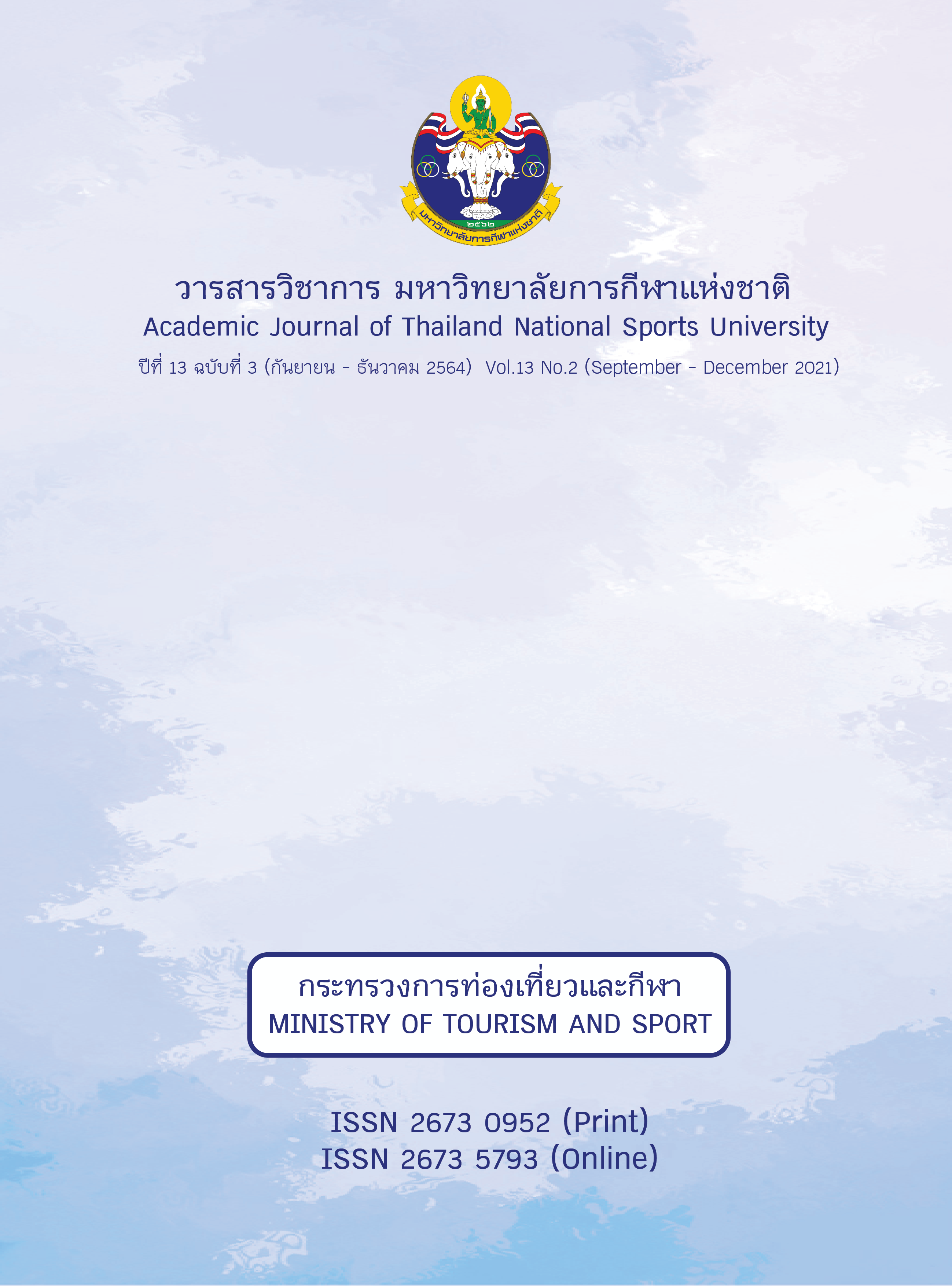REWARD SYSTEM MANAGEMENT AND HUMAN CAPITAL MANAGEMENT EFFICIENCY OF THAI SPORTS EQUIPMENT BUSINESS
Main Article Content
Abstract
This research aimed to develop a correlation model of reward system management with human capital efficiency of Thai sports equipment business. This study was a quantitative research. Data were collected from questionnaires from 399 business establishments selling sports equipment that have registered with the Department of Business Development in 2019. Structural Equation Model (SEM) was applied to analyze the data. The results demonstrated that the reward system structure had both direct and indirect effects on the human capital efficiency with statistical significance. In terms of indirect effects, the reward management process of the sports equipment business in Thailand was found to be the mediator. When the structural elements of the reward system of the sports equipment business in Thailand was considered, it was discovered that business should prioritize the level of reward and the type of the reward with the fairness of reward allocation leading to the increase in the human capital efficiency. Further, the results illustrated that reward management system had a direct effect on the human capital efficiency with statistical significance. Thus, any organization aiming to optimize the human capital management of its business should value the importance of encouraging employees to participate and promoting communication as well as fairness of the reward management leading to more efficient in managing human capital.
Keywords: Reward system structure Reward management system Human capital management efficiency
Article Details
The published article is a copyright of the Academic Journal of Thailand National Sports University. The passage appeared in each article in this academic journal is a perspective of each author which is not related to the journal. Each author is required to be responsible for all components of his/her own article. If there are any mistakes, each author must be responsible for those mistakes on his/her own.
References
Andre, W. and Paul, J. (2013). The bonus as hygiene factor & colon; The role of reward systems in the high performance organization. Global Forum for Empirical Scholarship, 1(1), 41 - 59.
Armstrong, M. (2006). Strategic human resource management: A guide to action (3rd ed.). London: Kogan Page.
Bartosz, K. and Ireneusz, G. (2020). Gender and age as determinants of expected rate of return on human capital. Journal of Management & Business Administration, 28(4), 30 - 50.
Bohlander, G. W., Snell, S., and Sherman, A. (2001). Managing Human Resources (12th ed.). Ohio: South-Western College Pub.
Brown, D. and Sargeant, M. A. (2007). Job satisfaction, organizational commitment, and religions commitment of full – time university employees. Journal of Research on Christian Education, 16(2), 211 - 241.
Chen, M., Lam, H.K. Shi, Q. and Xiao, B. (2020). Reinforcement learning -based control of nonlinear systems using lyapunov stability concept and fuzzy reward scheme. IEEE Transactions on Circuits and Systems, 67(10), 2059 - 2063.
Claudia, H. and Brian, K. (2015). Excellence in reward systems. Franklin Business & Law Journal, 2015(3), 29 - 40.
David, K., Russ, C. and Benjamin, C. (2021). Charting a path between firm-specific incentives and human capital‐based competitive advantage. Strategic Management Journal, 42(2), 386 - 412.
Day, N E. (2007). An investigation into pay communication: Is ignorance Bliss? Personnel Review, 36(5), 739 - 762.
Department of Business Development. (2019). Corporate information and business types in Thailand. Retrieved from https://datawarehouse.dbd.go.th/index
Fatile, J. and Hassan, K. (2020). Technological innovation and human capital development in Nigeria: A study of Ogun State Technological Hub. BVIMSR Journal of Management Research, 12(2), 59 - 72.
Feng, J. Huang, S. and Chen, C. (2020). Modeling user interaction with app-based reward system: A graphical model approach integrated with max-margin learning. Transportation Research Part C, 120, 15 - 34.
Folger, R., and Konovsky, M. (1989). Effects of procedural and distributive justice on reactions to pay raise decisions. Academy of Management Journal, 32(1), 115 - 130.
Hair, J. F., Black, W.C., Babin, B. J., & Anderson, R. E. (2010). Multivariate data analysis (7th ed.). Upper Saddle River, NJ: Pearson Prentice Hall.
Heilmann, P. (2006). Commitment between employee and organization examined in Finnish ICT and paper business sectors. In Kolehmainen, Sinkka Vanhala – Merja, HRM – Between Performance and Employees. Proceedings from the HRM Conference in Helsinki.
Hume, D. (1995) Reward Management: Employee Performance, Motivation and Pay. Oxford: Blackwell Publishers Ltd.
Isablella, H., and Haibo, Z. (2021). Health as human capital in entrepreneurship: individual, extension, and substitution effects on entrepreneurial success. Entrepreneurship: Theory & Practice, 45(1), 18-42.
Jirawuttinunt, S., and Jhundraindra, J. (2018). The Effect of Human Capital Capabilities on Entrepreneurial Capabilities and the Performance of Thailand's small and Medium Enterprises. Humanities, Arts and Social Sciences Studies, 18(2), 535-556.
Kaouthar, L., Yu-Hsin, L., & Anooshed, R. (2020). Corporate governance, human capital resources, and firm performance: Exploring the missing links. Journal of General Management, 45(4), 192 - 205.
Kim, H. (2006). Strategic impacts of compensation system on organizational outcomes: an empirical study of the conceptualizations of fit and flexibility in the compensation design (Doctoral dissertation), The Ohio State University.
Lawler, E. (2003). The design of effective reward system, Motivation and work behavior (7th ed.). Boston: McGraw Hill.
Liang, Y., Fu, G., Yu, R., Bi, Y., & Din, X. (2021). The role of reward system in dishonest behavior: a functional near-infrared spectroscopy study. Brain Topography Journal, 34(1), 64 - 78.
Milkovich, G. T., and Newman, J. M. (2008). Compensation (9th ed.). Boston: McGraw - Hill Irwin.
Rahman, U. Y. (2020). Utilization of Indonesia's digital economy to invest in human capital and provide socio-economic support to stimulate economic growth. International Journal of Business & Administrative Studies, 6(6), 312 - 322.
Salim, C., and Yan, Z. (2020). Change gears before speeding up: The roles of Chief Executive Officer human capital and venture capitalist monitoring in Chief Executive Officer change before initial public offering. Strategic Management Journal, 41(9), 1653 - 1681.
Vannarajah, T. L. (2020). Motivation & reward system for employees of Ceylon Electricity Board in Jaffna. An International Multidisciplinary Research Journal, 10(4), 180 - 187.


